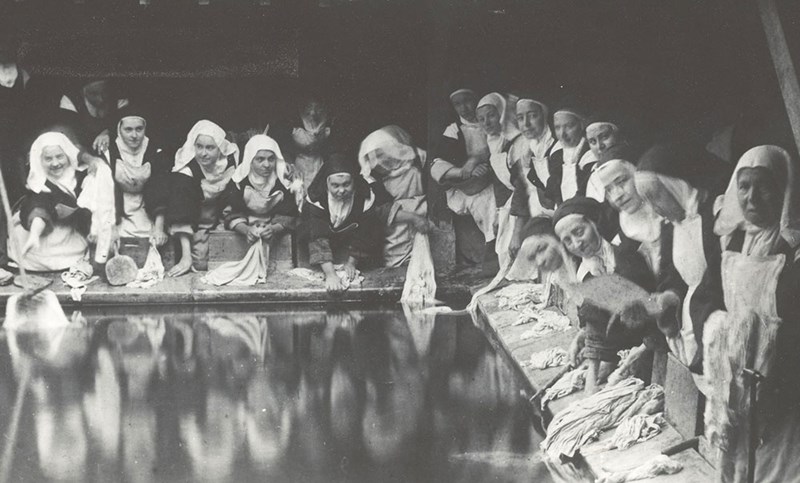In the Winter 2019 issue of LOGOS, Sister Albert Marie Surmanski, OP’s “St. Thérèse of Lisieux, Feminism and Eternity: In Conversation with Sister Elizabeth Johnson” examines how many of the contemporary feminist theologian’s concerns are legitimate and echoed in the thought of the 19th century Carmelite. Surmanski argues, however, that contra Johnson, the embrace of the classical conception of God – as seen in Thérèse’s life and thought – does not hinder but aids women in the quest for the living God.
Thérèse was not openly a feminist. Her background and training made this impossible. The basic philosophical stances of much feminist thought were alien to her. Thérèse did not read history as a pattern of male domination that she desired to subvert. She did not question the hierarchical structure of the Church. Neither did she reject the formulation of doctrine that she received through her family, school and parish. Thérèse’s theological thought and spiritual experience situate her squarely within the classic Catholic theological tradition. Yet, some of the concerns and attitudes found patterned throughout feminist writers, and in particular Sister Elizabeth Johnson, CSJ, do surface in Thérèse’s work.
While neither Johnson nor Thérèse reject theological reasoning, both value personal experience of God. Johnson suggests that God and the true identity of the human person are often discovered together. She writes, “The experience of God, which is never directly available, is mediated, among other ways but primordially so, through the changing history of oneself ... it transpires as the ultimate depth and radical essence of every personal experience such as love, fidelity, loneliness and death.” Classical Catholic theology would question whether awareness of God in one’s own life is a more “primordial” revelation than that given in scripture and tradition, but would not deny that God’s hand should be experienced in each human life.
Thérèse herself did experience God personally. Part of the value of reading her autobiography is to see how the closeness of God pervades every part of her life. ... Thérèse allows her growing experience of God to “cut through” the sometimes misleading jargon of pious language to reach the truth that it hides.

Sister Albert Marie Surmanski
[For example,] Thérèse rejects the term “merit,” while describing its true essence. She rejects an understanding of merit that involves proving one’s own worthiness to God and “earning” heaven. What she describes is true merit – to cooperate with God’s freely- given love so as to grow in love. A deeper ability to love is the true reward gained.
Johnson’s and Thérèse’s opinions differ dramatically on the question of God’s eternity. Johnson gives a list of classical attributes of God that she finds problematic. These are “infinite, self-existent, incorporeal, eternal, immutable, impassible, simple, perfect, omniscient, omnipotent.” Johnson objects to the origin of these divine attributes, which she considers to be imaginative projections by men of what they consider to be their greatest strengths. She claims that this understanding of God is “the quintessential embodiment of the solitary ruling male ego, above the fray, perfectly happy in himself.”
On the question of eternity Thérèse offers a lived rebuttal to Johnson. The idea of eternity shines through Thérèse’s life precisely in the elements of her theology highlighted as being most connected to a feminine self-awareness: her relationships, her attentiveness to the embodied details of daily life, her rejection of what is oppressive and her self-acceptance. In Thérèse’s life, the knowledge of God as eternal enriched her feminine experience of the supernatural.
God as eternal can be seen also in the places where Thérèse “resists” or breaks through the oppressive. When Thérèse comes up against unjust restrictions in Italy, it is her unbounded trust in God that allows her to transgress them. She is God’s daughter and should not be barred from the treasures of the Church. It is also, however, her trust in God that ultimately allows her to transcend them.
Considering Thérèse alongside Johnson shows that while many of the premises of Johnson’s feminist theology are incompatible with the dogmatic theology of the Catholic tradition, some of Johnson’s insights point to uniquely feminine concerns that can be incorporated into orthodox theology. It is both possible and appropriate for theological inquiry to ask questions about personal life experience, relationship, what affirms the goodness of womanhood and how to find the living reality sometimes hidden behind pious language. The life of Thérèse helps the Catholic theologian who wants to work within the magisterial tradition to appreciate legitimate concerns raised by feminist theologians and to value their insights, while still holding to the classical understanding of God as unchanging and infinitely blissful.
The full article “St. Therese of Lisieux, Feminism and Eternity: In Conversation with Sister Elizabeth Johnson” is available on Project Muse.





